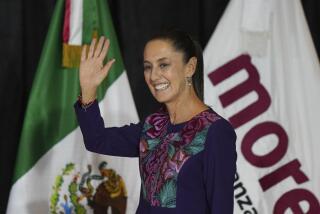PRI Keeps 2 States, Loses 1 in Elections
- Share via
MEXICO CITY — The ruling Institutional Revolutionary Party won two Mexican governorships this weekend but lost a third state race as opposition parties made inroads into the PRI’s traditional victory margins, according to nearly complete official election results released Monday.
In the small central state of Aguascalientes, the opposition National Action Party, or PAN, defeated the PRI to take the governor’s seat for the first time. That avenged the PRI’s gubernatorial victory over the PAN last month in Chihuahua in the north and restored the PAN’s claim as a serious contender for the presidency in 2000.
PRI candidates were victorious, however, in Veracruz and Oaxaca in the south, maintaining the ruling party’s longtime grip on those states. But in both cases, the PRI’s margin of victory fell compared with the 1992 races in those states.
Analysts said the results this year should raise warning signals for the PRI, which last year lost its majority in the national Congress as well as Mexico City’s first mayoral race. Other commentators suggested that the results showed growing disaffection with all political parties, as voters opted for well-known individual candidates rather than party platforms.
Felipe Calderon, national PAN president, said of candidate Felipe Gonzalez’s victory in Aguascalientes: “This gives us a much broader space to take on with greater speed and depth the reorganization of the party and its platform . . . so that we can be well prepared, united and strong going into the 2000 election.”
Gonzalez’s victory was all the more sweet because he defeated Hector Hugo Olivares, whose family is regarded as one of the mainstays of the national PRI organization, by a thumping 53% to 37%. The PAN took control of the state legislature as well.
“The PRI’s electoral structure failed” in Aguascalientes, El Universal newspaper declared. “The myth of an electoral organization that wins elections was buried by the PAN.”
In the important state of Veracruz, on the Gulf Coast, PRI candidate Miguel Aleman, the billionaire son and namesake of the man who was Mexico’s president from 1946 to 1952, took 50% of the vote to win easily over a divided opposition. The right-wing PAN, however, claimed a major advance, as businessman candidate Luis Pazos won 27% of the vote compared with just 3% for the PAN in 1992. That allowed the PAN to sweep past the leftist Democratic Revolution Party, or PRD, and become the No. 2 party in Veracruz.
Aleman, a television magnate often mentioned as a potential PRI presidential candidate in 2000, told supporters that he will not seek that nomination and will serve a full six-year term as governor.
In Oaxaca, one of Mexico’s poorest states, PRI candidate Jose Murat won with 49% of the vote, but the PRD scored a major advance as candidate Hector Sanchez took 37% compared with the party’s 10% in 1992, emboldening PRD supporters to claim their own boost for the 2000 presidential race.
The PRI has dominated Mexican politics since 1929. It lost its first governorship to the PAN in 1989 and now holds 24 states, compared with six for the PAN and one for the PRD.
Historian Enrique Krauze, discussing the results of Sunday’s races on national television, said the relative absence of fraud allegations in the three states underscored the success of reforms this decade that created independent national and state election systems.
But Krauze also said the results indicated that many voters had sought to vote for “a providential man,” or divinely guided individual, rather than for a party with a clear program and platform--a potentially worrying development.
“We have had too many providential men in Mexico. The providential man too easily turns to demagoguery, and to the pursuit of unachievable ideas, resulting in disenchantment with the democratic system itself,” he said.
More to Read
Sign up for Essential California
The most important California stories and recommendations in your inbox every morning.
You may occasionally receive promotional content from the Los Angeles Times.













